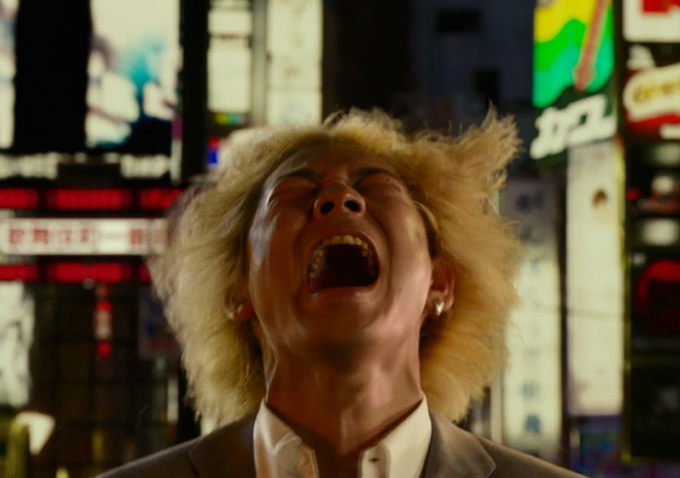Prolific Japanese filmmaker Sion Sono broke through with stateside arthouse genre fans with his bloody, attention-grabbing “Cold Fish,” and wild, four-hour epic “Love Exposure.” Like his countryman Takashi Miike, he’s shown he’s able to switch up styles easily, also directing, among his many pictures, the nuclear crisis drama “The Land Of Hope.” All that said, I had yet to sit down with film by Sono until “Shinjuku Swan,” and I wish I had a better introduction to his work. While there are flashes of the filmmaker’s gonzo style that I had read about, for the most part, “Shinjuku Swan” is a plodding tale about a young man who finds a new lease on life working for the yakuza, but seems to learn very little in this slightly comedic, mostly dramatic, and largely dull picture.
With his shock of yellow hair, it’s hard to miss Tatsuhiko Shiratori (Gô Ayano), who we first meet wandering the red light district of Shinjuku with only a few coins in his pocket, the clothes on his back, and zero prospects. Broken as he is, Tatsuhiko is not beaten, and when he gets into a rumble with a small group of street toughs, his resilience to keep fighting, outnumbered and walloped as he is, impresses Mako (Yusuke Iseya). The dapper gangster takes Tatshuiko under his wing and trains him to be scout for the Burst clan. Tatsuhiko’s job will be to entice young girls into working in the group’s sex services outlets. However, trouble soon rears its head when Burst clashes with the rival Harlem crew, and one of their captains, the deadly Hideyoshi (Takayuki Yamada), turns out to be linked to Tatsuhiko’s past.
READ MORE: Watch The First Trailer For Sion Sono’s ‘Shinjuku Swan’
Sprawling to nearly two-hours-and-twenty-minutes long, the screenplay by Osamu Suzuki and Mataichirô Yamamoto, an adaptation of the manga by Ken Wakui, often places the emphasis on the wrong story beats. Teased early on, and built up as something with some weighty significance, the final reveal of the connection between Tatsuhiko and Hideyoshi is both silly and deflating, particularly as it anchors the climax of the movie. Meanwhile, supporting characters like club madame Ryoko (Yu Yamada), suddenly gain convenient influence after being sidelined from the main narrative. Perhaps the film’s most fatal story flaw is that it’s not that interesting. While conceptually, setting a story within this specific slice of girl-running gangs could be fascinating, large chunks of the narrative are given over to guys in suits talking about the next move they need to make to stay in power. And when things truly start to drag, fistfights pepper the proceedings to ensure it still has a pulse.
However, for all the film’s script flaws, it’s the morally ambiguous tone that’s most troubling. Essentially, Tatsuhiko is a pimp, and when he initially raises concerns about leading women into prostitution, Mako sells him on a line that he’s actually improving the lives of these girls. It’s a rationale that Tatsuhiko swallows so wholly that even in the wake of witnessing the women he works with succumb to physical and sexual abuse, drug addiction, and suicide, he doesn’t waver. This isn’t viewed as a character weakness in Tatsuhiko, but rather its presented as evidence that he’s an endearing, well-meaning person at heart, with only the best interests of those he turns over to massage parlors and sex dens. It’s an equation that doesn’t work, and as the film goes on, it’s hard to ignore that the hero is a willing participant in making the lives of countless women miserable. The film itself also doesn’t know where to stand on the issue, offering half-hearted counter arguments that indeed, for some women, they like this line of work, and are making the kind of money that allows them to lead better lives. Sion Sono doesn’t want to judge Tatsuhiko too closely, but it doing so, he lets the rest of the characters, except for the ones that need to occupy villainous roles, off the hook.
READ MORE: Watch The Bonkers And Bloody Trailer For Sion Sono’s ‘Tag’
Not so much building to a showdown so much as eventually arriving at one, in its later stages, “Shinjuku Swan” makes an unsuccessful attempt to say something about the connection between class, ambition, and loyalty, but the message is as unclear as any other of the thematic elements of the movie. It’s this feeling of a lack of commitment that pervades much of film, as it swings from comedy to drama with little rhyme or reason from moment to moment, and stylistically, remains mostly un-noteworthy, except when there is a random burst of rear projection work or a fight scene to choreograph. While it’s not quite an ugly duckling, “Shinjuku Swan” never takes flight into something memorable. [C-]





